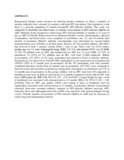| dc.identifier.citation | Newman, Laura., Njoroge, Anne., Chohan, Bhavna., Magaret, Amalia., Gorstein, Jonathan., Overbaugh, Julie M., Wamalwa, Dalton., Obimbo, Elizabeth M., Nduati, Ruth W (2015). Sustained responses to measles revaccination in HIV Infected Children on ART in Kenya. Croi 2015. Conference on retroviruses and opportunistic infections. February 23-26, 2015 | en_US |
| dc.description.abstract | Background: Despite recent advances in reducing measles incidence in Africa, a number of measles outbreaks have occurred in countries with high HIV prevalence. One
hypothesis is that there is a growing population of measles-susceptible HIV-infected children. This study was conducted to determine the effectiveness of measles revaccination in
HIV-infected children on ART.
Methods: In this prospective cohort study, HIV-infected children 15 months to 12 years of age on ART in Nairobi, Kenya received an additional measles vaccine. Questionnaires,
physical examinations, and blood draws were completed at enrollment, one, 12, and 24 months after measles revaccination. Measles antibody concentrations were determined by
enzyme-linked immunosorbent assay (ELISA) at all time points.
Results: Of 232 enrolled children, 228 (98%) had received at least 1 measles vaccine before 1 year of age. There were 123 (53%) males, median age was 7.5 years (interquartile
range (IQR): 5.5–9.5), and median CD4% was 32 [IQR: 27–38]. All children were on ART, and median time on ART was 3.4 years (IQR: 1.8–4.9). At enrollment, 52 (23%) of 231
children had an HIV viral load ≥1,000 copies/mL. Before revaccination, 125 (54%) of 232 study participants had protective levels of measles antibody. Seropositivity was observed
in 216/220 (98%) participants at one month post revaccination and 158/224 (70%) at 12 months post revaccination. Of the 187 participants with with currently completed
laboratory results from 24 months post revaccination, 105 (58%) were seropositive. Seroconversion and sustained seropositivity among those seronegative at enrollment was 37%
at 12 months post revaccination. In this group, children with an HIV viral load <50 copies/mL at enrollment were twice as likely to seroconvert at 12 months compared to those
with an HIV viral load ≥1000 copies/mL (RR=2.04, 95% CI 1.01 – 4.10, p=0.047). A larger height-for-age z-score at enrollment was associated with seroconversion at 12 months
(RR=1.24, 95% CI 1.04 – 1.48, p=0.016). Time on ART, age, gender, CD4%, and vitamin A status at enrollment were not significantly associated with seroconversion at 12 months.
Conclusions: Measles revaccination conferred short-term sustained antibody response in HIV-infected children receiving ART, especially those who had suppressed levels of HIV
virus and those with increased height-for-age z-score. Periodic measles revaccination of HIV-infected children on ART may be necessary to confer long-term immunologic memory | en_US |

